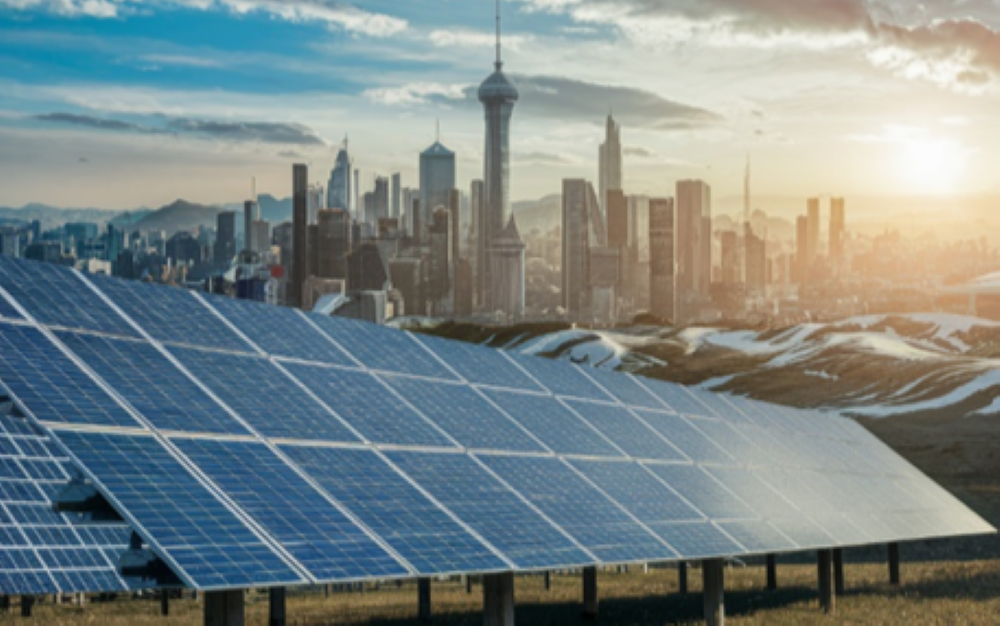Zero carbon, zero cost

Abundant green energy spawns new economic goldrush
- Dateline
- 29 April 2038
Ahmad wipes the sweat from his brow, having just installed another solar farm under the scorching Jakarta sun. As a welcome breeze begins to stir, he pauses only briefly; there’s no time to enjoy this success. His gaze shifts to a rival firm erecting two new wind turbines nearby. Already behind schedule, he hurries off to his next major appointment – a bid for an even larger solar project.
Economies of scale, technological advancements, and the proliferation of affordable renewable energy have driven down costs for solar, wind, and battery storage since the early 2000s, a trend that accelerated through the 2020s and 2030s. By the mid-2020s, investments in coal, gas, and nuclear energy had become financially questionable compared to renewables. By mid-2030, as the costs of renewables and battery storage continued to decline, fossil fuels rapidly became obsolete and economically untenable.
Earlier concerns about the variability of renewable energy and the challenges of meeting grid baseload demands proved to be unfounded. The affordability of renewables – especially solar – enabled the installation of excess generation capacity which, alongside low-cost modular battery storage, ensured power availability even during challenging conditions like windless, cloudy, and short winter days. During the remainder of the year when the sun does shine, this excess generation resulted in an abundance of electricity that, with no fuel input costs, has a marginal cost of production of nearly zero.
This abundant supply has driven energy prices to record lows. Companies that had built their reputations on energy efficiency found themselves sidelined as their customers were no longer willing to pay a premium for efficiency. Attempts by these industries to lobby against +100% renewable energy were overwhelmed by climate advocates and the evidence of burgeoning growth in new industries and economic opportunities. Technologies and processes once deemed too energy-intensive, such as desalination, vertical farming, and complex recycling methods, are now at the forefront of a low-carbon industrial revolution.
Reflecting on these changes, Ahmad, whose company finalized the switch to electric construction vehicles last year, has seen firsthand a significant drop in his own installation costs. But regretfully he knows that competition in the market is so intense he will have to pass these savings on to his client to stand any chance of winning the tender.
Get in touch
Futureworld has worked with major clients around the world to develop and establish new business opportunities created by the shifting energy paradigm and sustainability imperatives. These range from the shift to renewables, monetization options for excess capacity and a suite of offerings across the broader hydrogen economy. For more information on this scenario and to discuss the implications for your business, feel free to contact the author Stuart Murray and our energy expert Francis Smit.
Links to related stories
- How limitless green energy would change the world – BBC, 7 October 2022
- Energy storage is key to unlocking renewable power's full potential – Economic Times, 2 May 2022
- California achieves critical milestone in renewable generation – The Cool Down, 16 April 2024
- Mindbullet: Exponential tech kills carbon habits (Dateline: 27 August 2036)
- Mindbullet Solar power goes viral (Dateline: 15 March 2022)
Warning: Hazardous thinking at work
Despite appearances to the contrary, Futureworld cannot and does not predict the future. Our Mindbullets scenarios are fictitious and designed purely to explore possible futures, challenge and stimulate strategic thinking. Use these at your own risk. Any reference to actual people, entities or events is entirely allegorical. Copyright Futureworld International Limited. Reproduction or distribution permitted only with recognition of Copyright and the inclusion of this disclaimer.